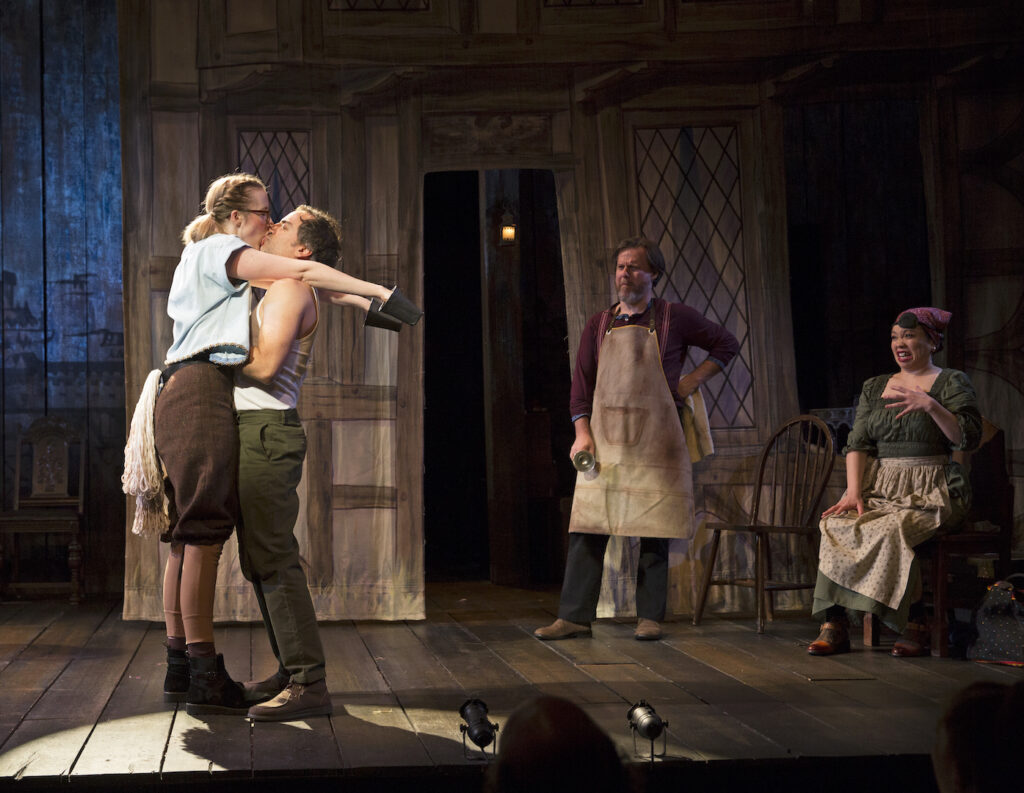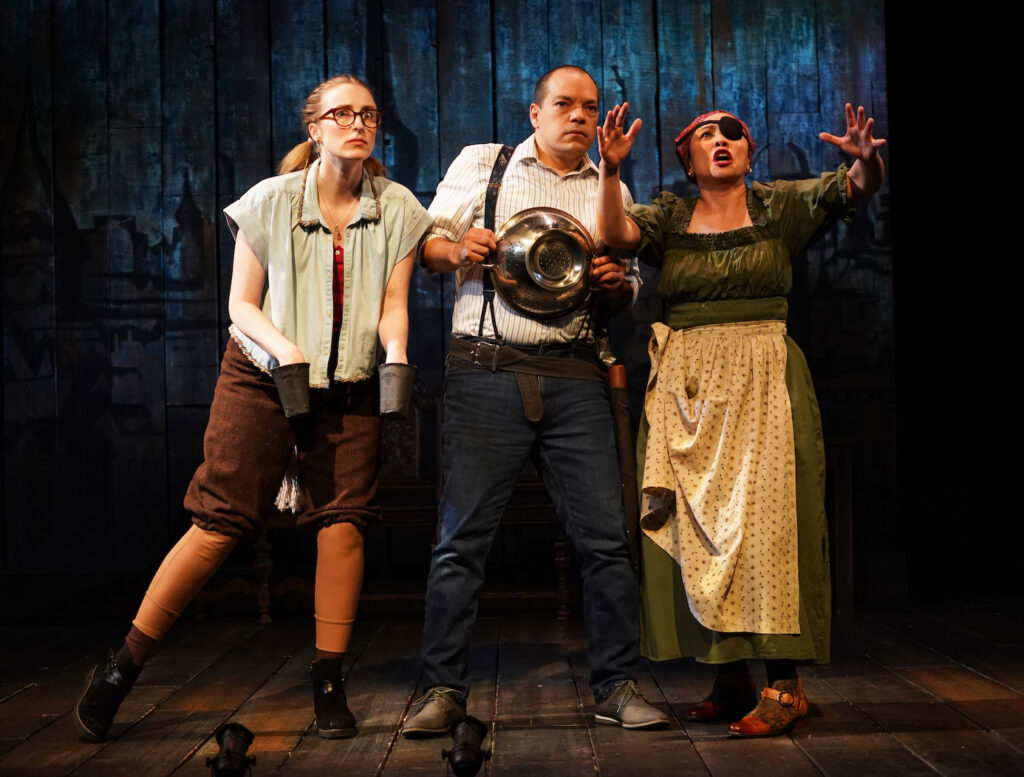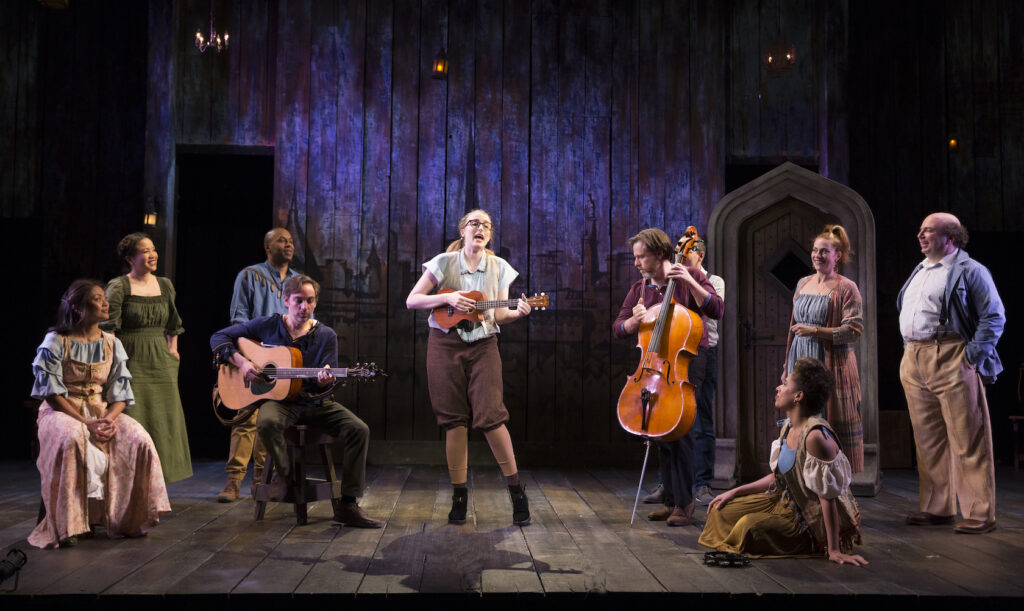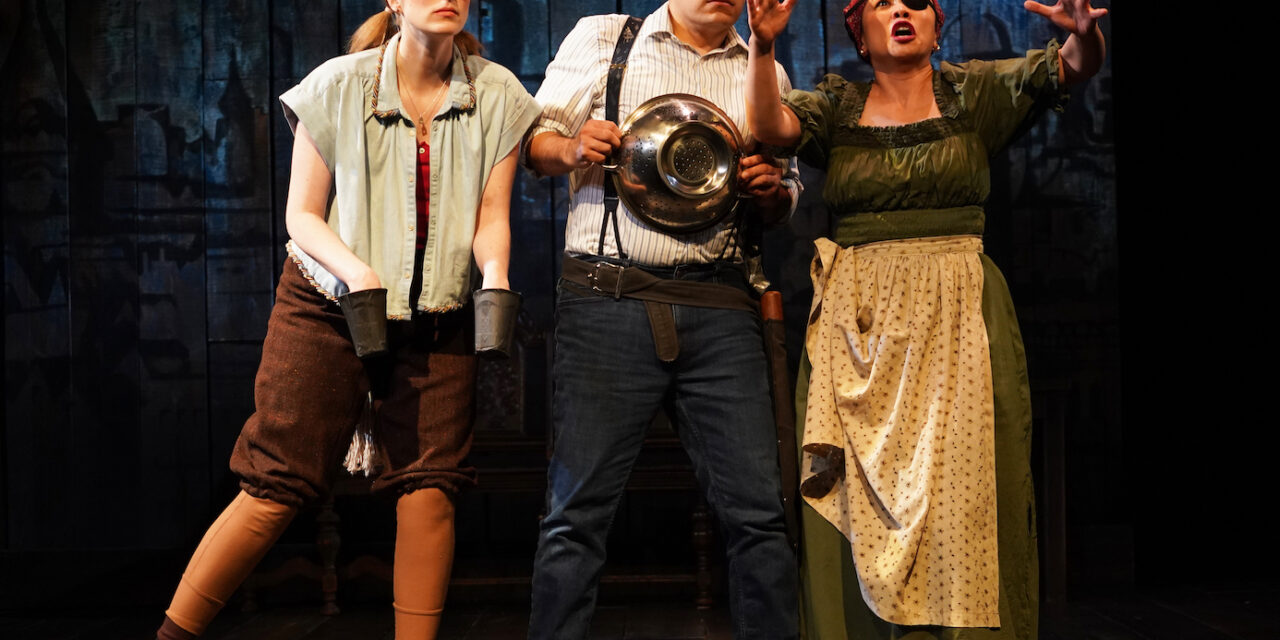By JK Clarke . . .
For years, when I heard the play title, The Knight of the Burning Pestle, I often wondered what on earth it could mean. I knew what a pestle was (a stick, of sorts, used to mash grains, plants or minerals), but I couldn’t imagine how such a device could have any crossover with the chivalric noble class of England’s bygone era. These ponderings were, of course, pre-Google, when one could as easily let a question go unanswered as one can quickly find one today. So, I remained in the dark; and as the play was seldom performed, it never really came up. Fast forward to a few weeks ago, when Red Bull Theater mounted their version of the 1607 Jacobean play at the Lucille Lortel—the first revival in New York in over 50 years. Mystery solved. It is, it turns out, a 400-year-old farce, and a delightful one at that.
Considering that Shakespeare (who begin playwriting in the early 1590s) was known for breaking the mold of the plays of his youth—Christian-themed treatises on good and evil, often referred to as “morality” plays—it’s rather surprising that within 20 years we have the arrival of Francis Beaumont’s The Knight of the Burning Pestle, a satire that not only quotes Shakespeare’s plays (!!), but pokes fun at the structure and themes of Elizabethan works of just a few years prior.

Knight enlivens the spirit of satire not only by breaking the fourth wall, but does so doubly—also breaking the wall of the play within the play itself (a device Shakespeare used to remarkable effect in Hamlet with the play-within-a-play, The Mousetrap). Knight comes right out of the gate with “audience members,” a town grocer and his wife, storming the stage to protest the company’s production because it supposedly denigrates their social class. Sound familiar? We’re seeing that a lot these days, right down to political protesters rushing the stage with banners to object to a Shakespeare in the Park production of Julius Caesar in the summer of 2017.
The Knight of the Burning Pestle starts right in with the silliness almost as soon as the play opens. As a troupe begins performing The London Merchant (which doesn’t actually exist, as far as we know), which purportedly lampoons the business/merchant class of the city, an audience member, who turns out to be a “grocer,” leaps up to object: “I have observed you still sneer at citizens; and now you call your play ‘The London Merchant.’ Down with your title, Madam, down with your title!” While having enjoyed satire in the past, George, the Grocer (delightfully played by Darius Pierce) and his wife, Nell (a very amusing Jessie Austrian), whom we’d probably label a “Karen” today, are outraged that their people could be the object of derision. They want to know “why could not [the company] be contented with The Legend of Lord Wittington and His Exemplary Cat . . .” and other such banal titles. Everyone likes a joke until it’s at their expense.


George and Nell suggest they perform, instead, a chivalric tale using their budding thespian shop assistant, Rafe (Paco Tolson, entertaining) as the hero. His herald, a flaming pestle (a phallic pun, no doubt, with allusions to the fiery effects of syphilis), precedes his antics. Rafe interrupts the main tale, of a young woman being coerced into marrying a man she doesn’t love. Hilarity ensues.
The story, of course, is of very little consequence, because the main point is the mockery of such oft-repeated stories. It’s only natural that where there is representation of heroism, there is also its lampooning, and Knight does so beautifully, but without spite. On paper, it’s not a play one would go back to for a second look; but, well performed, as it is here, it’s like a full-length version of the Mechanicals section of A Midsummer Night’s Dream, in which a group of bumbling laborers convene to put on a play for the wedding of the King and Queen—not great theater, but utterly first-rate comedy, especially in a great production.


Co-directors Noah Brody and Emily Young focus on the correct elements of this play: having fun with the material. The actors seem to be having as much fun as the audience, which is always infectious. And with talents like recent New York newcomer (and Oregon Shakespeare Festival veteran) Royer Bockus, whose remarkable clowning skills added humor to every scene (particularly with her Monty Python-esque horse imitation), the audience and cast were frequently breaking into giggles. Regardless of what one might think of a play, humor almost always lends itself to an enjoyable evening. Anachronisms abound, and at one point the audience is encouraged to sing along to some old-ish ditties (like Bobby McFerrin’s whistled 1988 earwormer “Don’t Worry, Be Happy”).
Red Bull Theater has been praise-worthy in their regular revivals of long-neglected works, from this season’s entertaining Arden of Faversham, to other Jacobian classics like ‘Tis Pity She’s a Whore. They are joined in this production by the dynamic and award-winning Fiasco Theater, known for imaginative productions of everything from Shakespeare to Sondheim. An admirable collaboration indeed. One hopes they will re-convene turn out future projects as entertaining as this one.
Knight of the Burning Pestle. Through May 13 at the Lucille Lortel Theatre (121 Christopher Street, between Bleecker and Hudson Streets). Two hours, five minutes with one intermission. www.redbulltheater.com
Photos: Carol Rosegg


















